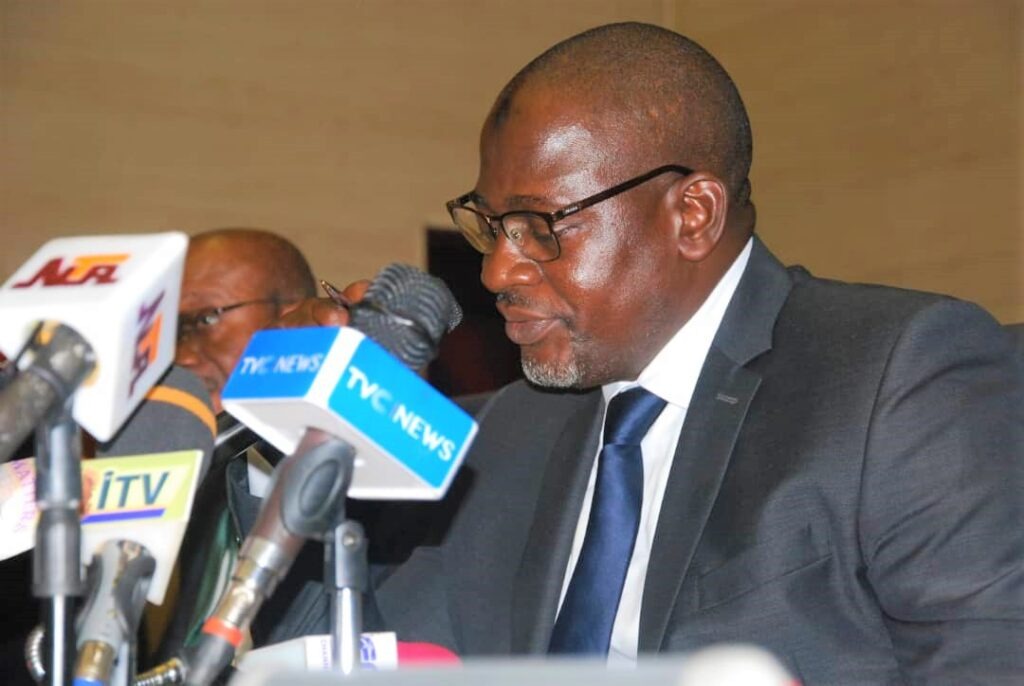“The responsibility bestowed on us is critical to the smooth operations of the various tiers and arms of government in Nigeria and, by implication, the well-being of the Nigerian people. We are, however, undaunted by the enormity of the task ahead of us. We shall do everything within our powers to achieve our collective goals to justify the confidence reposed in us”, Mr. Muhammad M. Nami, Executive Chairman, Federal Inland Revenue Service (FIRS), promised at the occasion of the inauguration of the Board of the FIRS on Thursday 16th January, 2020.
He stressed the fact that the task before the Board could only be discharged efficiently “if we work together as a team and as a united Board, and as well as work in harmony with the Management and Staff of the Service. Once we are able to work in this manner we are sure to take the Service to the desirable height and ensure maximum increase in tax revenue.”
As tax administrators and custodians of the Nigerian tax system, he noted that the Board has a responsibility to the nation to implement all tax policies and laws in a manner that would ensure optimal benefit to the nation. “We should therefore be committed to providing excellent service to the people of Nigeria. Our sense of responsibility should draw from the fact that the various tiers of government (Federal, States and Local Governments) as well as the arms of government (Executive, Legislative and Judiciary) all rely on us to provide adequate funds for their activities and development projects, especially in the face of dwindling and uncertain revenues from the oil sector. We cannot therefore afford to fail in this regard,” he also said.
Acknowledging the fact that the nation looks up to the Board for a leeway out of the present economic crunch, Mr. Nami asked for faith in the Board’s ability to discharge the task of generating adequate revenue to meet the development needs of Nigeria. He, therefore, called on Nigerians to support the Board, and to constructively engage them.
Also noting that FIRS is a work in progress which needs continuous improvement, Nami assured that he intends to build on the achievements of his predecessors in office while building a tax administration that would not only deliver on its mandate but also that which Nigerians shall all be proud of.
“FIRS is a work in progress which needs continuous improvement. And so, as it is with any institution in the world or with any human endeavor, FIRS has had its fair share of challenges, some of which it has been able to withstand so far. It is our duty at this point to strengthen it to be able to withstand and overcome the challenges that are ahead,” according to him
Speaking about what it would take to reposition FIRS for better service to the taxpayers, he highlighted four cardinal pillars on which their efforts are anchored.
On rebuilding FIRS’ institutional framework, he looks to build and strengthen the capacity of departments and units to deliver on their mandates on a long term and sustainable basis; shedding some light on robust collaboration with stakeholders, he acknowledged that the FIRS is not an island. “We operate in the Nigerian economy. Our success is hinged on the contributions of other key actors in the Nigerian nation. We will therefore endeavor to foster genuine collaboration between FIRS and key stakeholders in the Nigerian tax system and economy, in order to provide a unified view of our services through proper planning. This will eliminate critical bottlenecks,” he said.
Considering building a customer (taxpayer-centric) institution: “We will build FIRS into an institution that supports Nigeria’s longing to become an investment destination by moving up further on the global ease of doing business ladder. We can only do this if we focus on efficient service delivery to taxpayers and provide a positive customer experience on all tax compliant processes. We must not forget the Service component of our name. We exist to provide service to taxpayers. If we do not do our work professionally, with integrity, on time, efficiently, we would miss the ‘service’ essence of our name.”
As data-centric institution, “We will make FIRS a data-centric institution. That is, one in which its people, processes, and technologies are all geared towards a clear goal of generating and utilising clear and relevant data/information for efficient revenue generation,” he also said.
Targeting the first hundred days in the saddle, pursuant to four cardinal pillars on which their efforts are anchored, he intends to prioritise the following: Building staff capacities for service delivery. In his word: “When we make doing business easier for taxpayers, our collection target will be easy to achieve.” He looks to close all lien cases in order to build new enforcement strategies; he is about restructuring and repositioning of audit function; he disclosed that review of structures for optimal performance has commenced and would be unveiled at the FIRS Corporate Strategic Retreat.
According to him, there will be Corporate Strategic Retreat to define roles and target setting; Capacity building on Finance Bill and other Tax programmes; Review of TCC administration process which started with January TCC issuance programme; Revamping of the integrated tax administration system (ITAS) operations, starting with adopting the current capabilities and upgrade to next version of the solution; Repositioning of the large and medium taxpayers’ offices; Determination of collection focused key performance indicators (KPIs) and other key service delivery parameters; Repositioning of collections, reporting and accounting; Overhauling of critical Information and Communication Technology (ICT) infrastructures which are cost effective for efficient service delivery; and Road mapping of Federal Ministry of Finance monitoring and evaluation (M&E) framework.
The FIRS boss used the occasion of the Board inauguration to solicit the cooperation and support of all stakeholders, especially the management and staff of FIRS in the task of rebuilding and repositioning FIRS for optimal performance.






